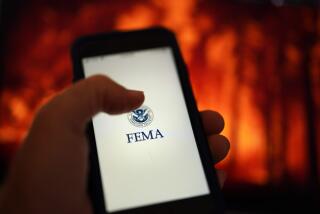FCC to Propose Cell Phone Wiretap Plan
- Share via
WASHINGTON — Weighing in on a long-simmering dispute between phone carriers, privacy advocates and the FBI, federal regulators are expected Thursday to propose giving law enforcement authorities additional wiretapping capabilities.
The Federal Communications Commission will seek public comment on a plan that proposes that telephone carriers tell law enforcers the location of a mobile phone user at the beginning and end of a tapped call, according to several sources familiar with the plan.
The proposal, which would allow authorities to pinpoint the location of a cellular phone user within about a 3-mile radius, represents a compromise: The FBI has been seeking to pinpoint the actual location of wireless phones, whereas privacy advocates don’t want any location information disclosed at all.
The proposal is the agency’s latest attempt to try to broker a deal between the telecommunications industry and the Justice Department on implementing a 1994 law aimed at preserving the ability of law enforcement to conduct wiretaps in the digital age.
Law enforcement officials say it has become increasingly difficult to track criminals as more of them embrace digital technologies such as the Internet and new wireless telephones.
But privacy advocates have protested the FBI’s requests, saying they infringe on the civil liberties of all phone users. They say the wiretap authority sought by the agency goes well beyond the scope of the 1994 law, known as the Communications Assistance for Law Enforcement Act.
“The notion that cellular phones can be used for tracking purposes is very shocking from a privacy perspective,” said Jim Dempsey, senior staff counsel at the Center for Democracy and Technology, a nonprofit privacy group in Washington.
Ironically, the booming wireless telephone industry is deploying technology that will allow 911 rescue and emergency teams to pinpoint the location of cellular phone users who call for help. But that system must be triggered by the telephone user and won’t aid law enforcement conducting surreptitious surveillance, officials say.
Under current law, police must give a judge evidence of probable cause of criminal activity to listen in on a phone call. But a lower legal standard applies if police just want to find out what numbers were called from a particular telephone. The police need show only that the information might be relevant to an investigation.
Besides the troublesome privacy issues raised by the FBI surveillance initiatives, critics say, the FBI’s requests would be enormously expensive to implement.
The agency has a $500-million fund to help telephone companies underwrite the cost of upgrading their phone networks to comply with any new FCC technical standards for providing wiretap information.
But even the Justice Department acknowledges that the money would cover less than a quarter of the cost of upgrading phone switches to provide additional location information.
“In excess of $2 billion would likely be needed by the government to reimburse telecommunications carriers to cover the cost of modifying the phone network,” wrote Atty. General Janet Reno, FBI Director Louis Freeh and Drug Enforcement Administration chief Tom Constantine in a letter sent to Sen. Ted Stevens (R-Alaska), chairman of the Senate Appropriations Committee.
*
Times staff writer Jube Shiver Jr. can be reached via e-mail at jube.shiver@latimes.com.






